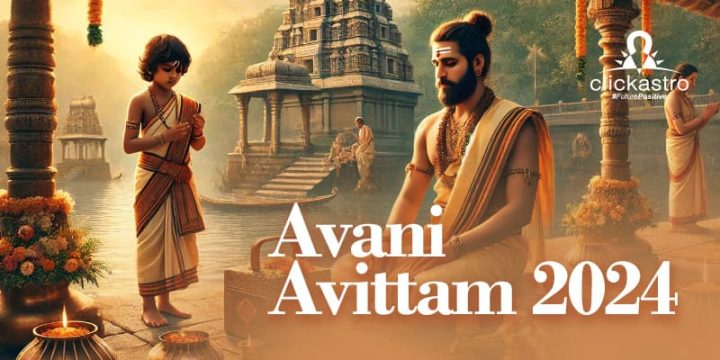Introduction
Avani Avittam, also known as ‘Upakramam,’ is an important ritual celebrated by the Brahmin community, particularly in Kerala and Tamil Nadu. This sacred observance falls on the Shravan Purnima (full moon day) of the traditional
Hindu calendar, a date that coincides with the festival of
Raksha Bandhan in North India. The term ‘Avani’ refers to a month in the Tamil calendar, while ‘Avittam’ denotes one of the
27 Nakshatras (constellations). Together, Avani Avittam signifies a time of renewal and spiritual commencement, marking the beginning of the study of Vedas. This day is also associated with the sacred thread ceremony, an important rite of passage for Brahmin males. Celebrated with fervour and devotion, Avani Avittam is not only a time for ritualistic observances but also introspection and spiritual cleansing.
In 2024, Avani Avittam will be observed on August 19, Monday.
Understanding Avani Avittam
Avani Avittam is a deeply significant observance within the Brahmin community. The Tamil ‘Avani’ month spans from mid-August to mid-September. ‘Avittam’ refers to the 23rd star in the constellation of 27 Nakshatras (stars). Avani Avittam is celebrated on the day governed by the star Avittam during the month of Avani, which coincides with the
Purnima (full moon) day.
This day is of immense importance to Brahmins worldwide, particularly those following the Yajur, Sama, and Rig Vedic traditions. For Yajur Vedic Brahmins, Avani Avittam marks the commencement of six months of rigorous Vedic study, culminating in the month of Makara (mid-January to mid-February).
The significance of Avani Avittam lies in its association with the sacred thread ceremony, known as ‘Upakarma,’ which symbolizes spiritual renewal and commitment to Vedic learning. The ritual involves changing the sacred thread, a practice that embodies the shedding of past impurities and the embrace of a fresh, purified life. This observance is not merely a regional or cultural festival but a profound spiritual event that reaffirms the dedication of Brahmins to their ancestral heritage and religious duties.
Rituals and Observances
Preparations and Sacred Vows
On the auspicious day of Avani Avittam, Brahmins commence their observances with a sacred vow known as ‘Mahasankalpam.’ This vow is a solemn declaration made to atone for the sins committed in the past year. The day begins at sunrise with a ritual bath, where Brahmins take a holy dip in a river, pond, or any water body. This act of bathing is believed to cleanse both the body and soul, preparing the individual for the sacred activities of the day.
The Sacred Thread Ceremony
The centrepiece of Avani Avittam is the changing of the sacred thread, known as ‘Janeyu’ or ‘Yajnopavit.’ This ceremony is of great importance and signifies a new beginning for the participants. Traditionally, this ritual is conducted on the banks of rivers, ponds, or in temples, although it can also be performed at home.
During the ceremony, Vedic mantras are recited, invoking divine blessings and sanctifying the process. The old sacred thread is discarded, symbolizing the renunciation of past impurities and mistakes. In its place, a new thread is donned, representing a fresh start imbued with purity and commitment to spiritual practices. The new thread is a reminder of the responsibilities and duties of a Brahmin, reinforcing their dedication to Vedic studies and righteous living.
Ancestral Offerings and Homams
In addition to the sacred thread ceremony, Avani Avittam involves offering ‘Tarpanam’ to ancestors. This ritual is an expression of respect and gratitude towards one’s forebears, acknowledging their role in the spiritual and physical lineage of the family. Tarpanam is performed with great reverence, as Brahmins believe that honouring their ancestors helps ensure their blessings and maintains the continuity of familial virtues and values.
Another significant aspect of Avani Avittam is the performance of
‘Homams’ or fire rituals. These rituals are conducted to seek divine blessings and to purify the environment. The fire in the Homam is considered a sacred witness to the vows and prayers offered during the ritual. Through the chanting of Vedic hymns and offerings into the fire, participants seek the favour of the deities and the purification of their souls.
Important Timings for Avani Avittam 2024
- Sunrise: August 19, 06:08 AM
- Sunset: August 19, 06:52 PM
- Purnima Tithi Timing: August 19, 03:05 AM – 11:55 PM
Significance of Avani Avittam
Avani Avittam marks the commencement of Vedic studies, particularly the study of the Yajur Veda, which continues for the next six months. This period of dedicated learning and recitation is crucial for Brahmin scholars as it reinforces their spiritual discipline and commitment to preserving ancient wisdom.
In Hindu mythology, Avani Avittam is also linked to the event involving Lord Vishnu’s incarnation as Lord Hayagriva. According to the legend, Lord Brahma, the creator god, had become proud of his vast knowledge of the Vedas. To teach him humility, Lord Vishnu manifested as Hayagriva, a deity with a horse’s head, and orchestrated the theft of the Vedas by the demons Madhu and Kaitabha. When the Vedas were stolen, Brahma was left distraught. In response to Brahma’s plea, Hayagriva defeated the demons, retrieved the sacred texts, and returned them to Brahma, thus reinstating the lost knowledge and curbing Brahma’s pride.
This mythological event underscores the values of humility, knowledge, and divine intervention in the preservation of sacred scriptures. Avani Avittam, therefore, not only marks the renewal of Vedic studies but also commemorates Hayagriva Jayanti, celebrating the deity who symbolizes wisdom and learning. The festival is a reminder of the continuous journey towards acquiring and respecting knowledge, and the importance of humility and devotion in that quest.
The Mythology Behind Avani Avittam
The mythology of Avani Avittam is deeply embedded in the Hindu lore. Central to this narrative is the divine interplay between Lord Vishnu and Lord Brahma, the creator god. According to tradition, Vishnu imparted the knowledge of the Vedas to Brahma, bestowing upon him the wisdom necessary to create and maintain the universe. However, as time passed, Brahma grew proud and arrogant about his mastery of the Vedas, forgetting that this knowledge was a divine gift from Vishnu.
To teach Brahma a lesson in humility, Vishnu conjured two formidable demons, Madhu and Kaitabha, from drops of water. These demons stole the Vedas from Brahma, plunging him into despair. Deprived of the sacred texts that formed the basis of his creative power, Brahma realized his folly and turned to Vishnu for help. Responding to Brahma’s heartfelt plea, Vishnu incarnated as Hayagriva, a unique deity with the head of a horse and the body of a human, symbolizing wisdom and strength.
Hayagriva confronted Madhu and Kaitabha in a fierce battle. Using his divine prowess, he defeated the demons and retrieved the Vedas. Returning the sacred texts to Brahma, Hayagriva not only restored the lost knowledge but also imparted a crucial lesson on the dangers of pride and the importance of humility. This mythological event is commemorated during Avani Avittam, underscoring the themes of humility, redemption, and the eternal quest for knowledge. The festival also celebrates Hayagriva Jayanti, honouring the deity who embodies wisdom and the preservation of sacred knowledge.
Benefits of Observing Avani Avittam
Observing Avani Avittam is believed to confer a multitude of spiritual benefits upon participants, deeply enriching their lives and reinforcing their faith. This sacred ritual is more than a tradition; it is a profound spiritual practice that cultivates respect, strength, and purity.
Respect and Gratitude
One of the primary benefits of Avani Avittam is the expression of respect and gratitude through the offering of Rishi Tarpanam. This ritual honours the ancient seers (Rishis) who imparted invaluable Vedic knowledge to humanity. By paying homage to these sages, practitioners acknowledge their indebtedness and ensure that their contributions to spiritual wisdom are never forgotten. This act of reverence strengthens the spiritual bond between past and present generations, fostering a sense of continuity and respect for tradition.
Strength and Dignity
The sacred thread ceremony, a cornerstone of Avani Avittam, involves the recitation of mantras while changing the old thread for a new one. This ritual is believed to bestow strength and dignity upon the practitioners. The new thread symbolizes a renewed commitment to moral and spiritual duties, providing a fresh start and a tangible reminder of the wearer’s sacred responsibilities. The mantras chanted during the ceremony invoke divine blessings, enhancing the wearer’s inner strength and resolve.
Spiritual Purification
A significant aspect of Avani Avittam is the recitation of the Gayatri Mantra, a powerful Vedic hymn dedicated to the sun deity, Savitr. Reciting this mantra 1008 times on Avani Avittam is thought to cleanse accumulated sins and purify the mind. This intensive spiritual exercise promotes mental clarity, focus, and peace, helping practitioners attain a state of inner purity and divine connection. The repetition of the Gayatri Mantra serves as a meditative practice that aligns the individual with cosmic energies, fostering a sense of spiritual renewal and enlightenment.
Conclusion
Avani Avittam is a spiritually enriching festival that signifies the renewal of learning and spiritual growth. This sacred day marks a time of retrospection, penitence, and gratitude, offering a new beginning for Brahmins worldwide. Through rituals such as the Mahasankalpam, sacred thread ceremony, and ancestral offerings, participants seek to cleanse their past sins, honour their ancestors, and reaffirm their dedication to Vedic knowledge. The celebration of Lord Vishnu’s incarnation as Hayagriva further emphasizes the importance of humility, wisdom, and divine guidance.
As we approach Avani Avittam 2024, falling on August 19, let us embrace these rituals with deep devotion and sincerity. This day offers an opportunity to seek divine blessings for strength, knowledge, and purity, fostering spiritual growth and reinforcing the commitment to righteousness. By participating in Avani Avittam, we honour our rich heritage and ensure the continuity of ancient traditions, paving the way for a spiritually enriched future.








